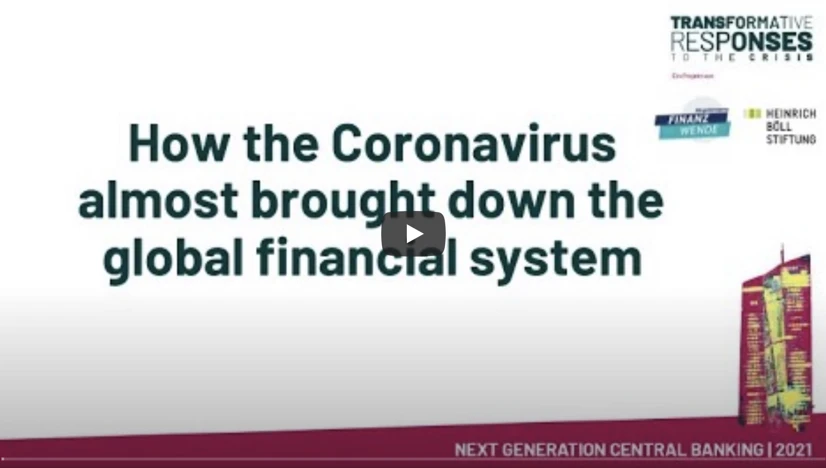NextGen Central Banking: How the coronavirus almost brought down the global financial system
Transformative Responses, Heinrich-Böll-Foundation & Finanzwende, 2021
This panel was part of the conference "Next Generation Gentral Banking - Climate Change, Inequality, Financial Instability" 03. - 05.02.2021. In March 2020, central banks have once again proven to be the first line of defense in crisis-ridden times. With their far reaching actions they prevented the world from experiencing a collapse of financial markets on top of the severe health and economic crisis caused by Covid-19. Since the global financial crisis, central banks' roles and repertoire have vastly changed. The Federal Reserve has recently adopted a new strategy of average inflation targeting for its monetary policy, and the European Central Bank is currently conducting the first strategy review in 17 years - President Lagarde has made it very clear that the ECB intends to address this new role. We believe that this calls for a wider debate on the role of central banks in times of financial instability, growing inequality and an escalating climate crisis. Central banks have powerful tools at their disposal. Should they - and if so, how - support policy goals beyond their traditional price stability mandate? The conference “Next Generation Central Banking: Climate change, inequality, financial instability” on 3-5. February 2021 provided a forum on these timely questions.
Comment from our editors:
The discussion of this panel debate revolves around the events of March 2020, when abnormal dislocations in the US Treasury market compelled the US Federal Reserve Bank to intervene on a historically unprecedented scale, in order to stabilise yet again the global financial system. The discussion starts with a presentation by Annette Vissing-Jørgensen on those events and proceeds with arguments on "flawed narratives" nourished by diverse financial institutions involved in apparently riskless activities but at the same time engaging in macro risk (Martin Hellwig), the so-called "constructive ambiguity" often proclaimed by central banks (Annette Vissing-Jørgensen), and "negative externality" which is thought to be contained by introducing fees such as a financial transaction tax (Sven Giegold). It is an interesting debate on risk allocation, fiscal vs financial dominance, and the ultimate issue of what is the most appropriate government spending that has the highest social return.
Go to: NextGen Central Banking: How the coronavirus almost brought down the global financial system

